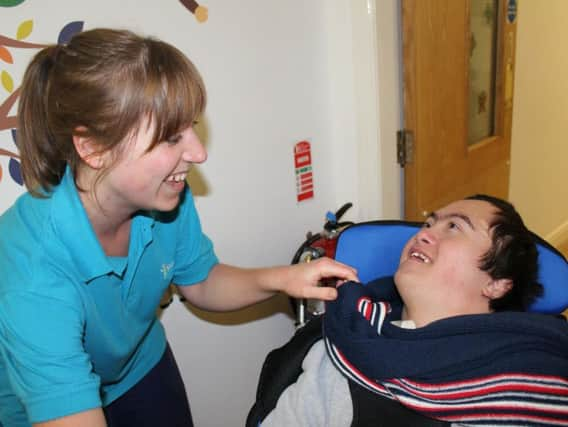Unsung community hero - Louise Leach


While Louise Leach was busy studying for GCSEs and A-Levels, like so many other students, she really didn’t know where life would take her and had no career path in mind.
But as the 29-year-old had been looking after her own brother who has special needs and epilepsy, being a children’s nurse seemed like the perfect choice and she is now a palliative care nurse at Derian House Children’s Hospice, in Chorley.
Advertisement
Hide AdAdvertisement
Hide AdLouise, who is originally from Glasgow and who trained as a paediatric nurse at the University of Cumbria, said: “I was not sure what I wanted to do with my life when I was in my teens but when I made the decision to be a children’s nurse, I knew I had made the right choice and everything simply fell into place.


“From a young age, I always helped to care for my brother who has special needs and epilepsy and I am sure this influenced my eventual decision.
“The first time I arrived at Derian House, on a placement, I just knew this was the nursing I was meant to do. I knew instinctively I would be the most effective in this environment. I felt like I had come home.”
As part of the Together For Short Lives charity campaign to recruit more paediatric palliative care nurses - #YouCanBeThatNurse – Louise is opening her heart about what drives her, as a nurse, to care and support children with life-threatening illnesses and life-limiting conditions.
Advertisement
Hide AdAdvertisement
Hide AdShe added: “I am proud to work at Derian House. I would urge nurses not to dismiss paediatric palliative care out of hand and think again.


“It really is rewarding. You can give quality care to the children; it’s one-to-one nursing and you’re able to commit a whole day to that one individual child – from basic nursing care, giving medication and monitoring, to washing and dressing the child in your care. You really feel that you’re making a difference to them and improving their quality of their life.
“One of the most precious moments for me is when a child who cannot communicate verbally lets you know how happy they are. Their face tells you everything, whether you’re giving them a hand massage or doing crafts, you know you’ve made them smile. You feel like you’ve made a breakthrough! ”
Yet Louise acknowledges that there is a sombre side to her role.
Advertisement
Hide AdAdvertisement
Hide AdShe said: “It’s really, really hard when a child dies and it does affect you.
“But it’s an honour to be there for both the child and their family and to try to make that time as easy as possible.
“A great deal of planning goes into this side of our care and we are there not only for the child but the whole family.”
Building and developing a relationship with families forms such an important part of Louise’s role, too.
Advertisement
Hide AdAdvertisement
Hide AdShe said: “It’s crucial families have confidence in us both as individual nurses and as a team. It’s vital we ask the right questions and communicate clearly, to find out what is important to the wider family as well as the child.”
Louise’s initial experience was as a nurse on a busy city neo-natal unit, where she gained the experience needed for her to pursue her career in paediatric palliative care nursing.
She explained: “In hospital you are part of a massive team.
“There may be more than 200 nurses and a huge multi-disciplinary team.
“Here at Derian, it does not look as ‘clinical’ as a hospital and feels more like home. In fact, we feel like family here. Because the team’s smaller, we know each other and are there to support each other – while still being professional, of course, and making sure we are working to the highest possible standards.
Advertisement
Hide AdAdvertisement
Hide Ad“I love paediatric palliative care nursing because you can bring your own unique skills to the role, whether that is your creative side, your musical side, your ideas or the way you communicate.”
And, as part of a process that ensures all our nurses remain at the very top of their field, Louise completes on-going training and professional development, remaining up-to-date with the latest medical developments and picking up management skills which allow her to work as a team leader.
Louise’s days are busy; she works 37.5 hours a week on a shift pattern, including a week of night shifts each month. But does she regret her choice to be a paediatric palliative care nurse? “No, not at all. It’s the best job in the world.”
Has Louise’s story inspired you to consider a career in paediatric palliative nursing? Visit http://www.togetherforshortlives.org.uk or search You Can Be That Nurse on YouTube for a short video.